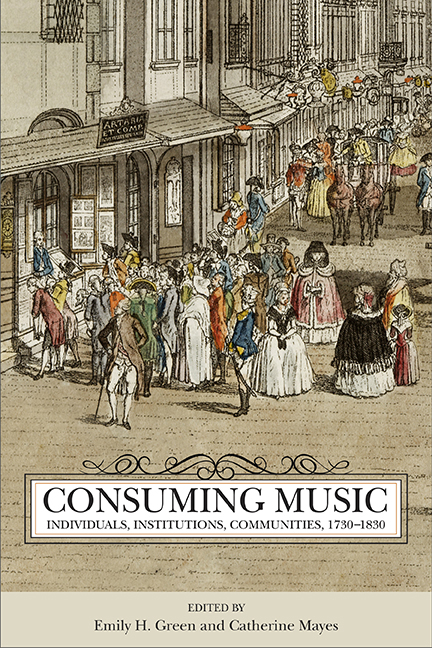Book contents
- Frontmatter
- Contents
- Acknowledgments
- Introduction
- Part One Selling Variety
- Part Two Edifying Readers
- Part Three Marketing the Mundane
- Part Four Cultivating Communities
- 8 Exchanging Ideas in a Changing World: Adolph Bernhard Marx and the Berliner allgemeine musikalische Zeitung in 1824
- 9 Parisian Opera between Commons and Commodity, ca. 1830
- List of Contributors
- Index
9 - Parisian Opera between Commons and Commodity, ca. 1830
from Part Four - Cultivating Communities
Published online by Cambridge University Press: 26 April 2018
- Frontmatter
- Contents
- Acknowledgments
- Introduction
- Part One Selling Variety
- Part Two Edifying Readers
- Part Three Marketing the Mundane
- Part Four Cultivating Communities
- 8 Exchanging Ideas in a Changing World: Adolph Bernhard Marx and the Berliner allgemeine musikalische Zeitung in 1824
- 9 Parisian Opera between Commons and Commodity, ca. 1830
- List of Contributors
- Index
Summary
In August 1831, Honoré de Balzac scored a major artistic and commercial success with the publication of La Peau de chagrin. One of the “philosophical studies” in his Comédie humaine, the novel chronicles the fantastic demise of Raphaël de Valentin. Down on his luck, the protagonist acquires a foreign talisman made of animal hide that will grant his every desire. With each wish it fulfills, however, the talisman shrinks; when it disappears, Raphaël dies. Thus the novel becomes the tale of a man who must desire nothing in order to survive. Surrounded by the lavish material and social trappings of Paris, he fails.
Despite the fantastic elements in its plot, La Peau de chagrin has long been understood as a commentary on the excesses of bourgeois materialism couched in ekphrastic descriptions of everyday life. The magic talisman, like the love potion in Tristan, is just a prop—the novel still works as a philosophical study without it. Balzac's narrative forces his readers to imagine the impossible task of not wanting anything while living in Paris. Thus even without the supernatural, his novel underscores the unavoidability and potential pitfalls of longing in a material world.
Balzac describes and cautions against a relatively new urban reality—one constructed by and for an emerging bourgeois society in which social and material desires are not satiated but instead beget further longing. Cultural theorists from Karl Marx on have discussed this intersection of desire, status, and goods in relation to the sociology of commodity capitalism. According to this point of view, a capitalistic system forces goods, labor, power, and social standing to enter into a complex network of exchanges in which, in contrast to earlier economic systems, there are fewer definite goals and boundaries; wealth, value, and power are defined by the relativism of a market in which anything could in theory be traded for anything else, so long as one could find a buyer. This results in a material and social system in which one could trade one's way up through reinvestment in the market, and the possibility of acquiring more goods or higher status in turn leads to a desire for more goods and status. The system, in short, makes one want more than one already has.
- Type
- Chapter
- Information
- Consuming MusicIndividuals, Institutions, Communities, 1730–1830, pp. 222 - 240Publisher: Boydell & BrewerPrint publication year: 2017

